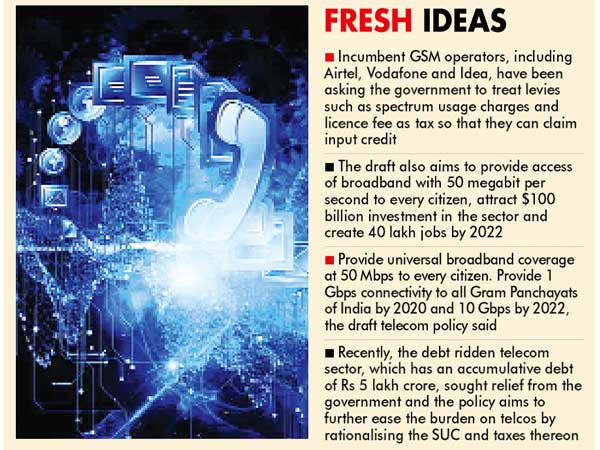
The much-awaited draft telecom policy has proposed a review licence and spectrum usage fees, levy of Universal Service Obligation Fund (USOF) and the concept of pass through revenues — some of the long standing demands of the operators — with the aim of promoting ease of doing business.
Incumbent GSM operators, including Airtel, Vodafone and Idea, have been asking the government to treat levies such as spectrum usage charges and licence fee as tax so that they can claim input credit.
The draft also aims to provide access of broadband with 50 megabit per second to every citizen, attract $100 billion investment in the sector and create 40 lakh jobs by 2022.
“Provide universal broadband coverage at 50 Mbps to every citizen. Provide 1 Gbps connectivity to all Gram Panchayats of India by 2020 and 10 Gbps by 2022,” the draft said.
The draft policy recommends rationalising spectrum usage charges (SUCs) to reflect the cost of regulation and administration of spectrum. It also looks at rationalising taxes and levies on digital communications equipment, infrastructure and services.
Recently, the debt ridden telecom sector, which has an accumulative debt of Rs 5 lakh crore, sought relief from the government and the policy aims to further ease the burden on telcos by rationalising the SUC and taxes thereon.
The draft NTP-18 is keen on reforming the guidelines for mergers & acquisitions, 2014 to enable simplification and fast tracking of approvals. Establishing exit norms for licencees including alignment to bankruptcy code to maximize telecom sector system efficiencies and consumers interest.
The NTP-18, which was released late night on Tuesday, also calls for enabling unbundling of different layers of infrastructure, network, services and applications layer through differential licensing.
Aiming to provide less regulations to promote data usgae among the masses, the draft also aims at establishing light touch licensing regime for the proliferation of public data offices and public data office aggregators for providing internet access through Wi-Fi Hotspots.
It also attempts to introduce various fiscal and non-fiscal benefits for development of telecom clusters around cable landing stations to foster innovation in digital communications technologies.




